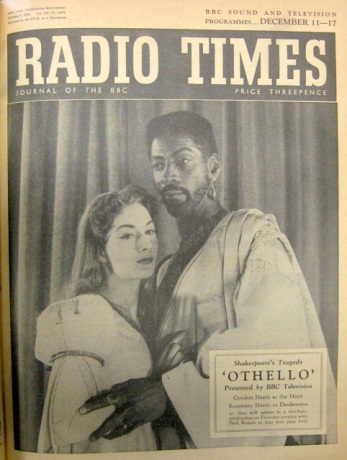 The 1955 BBC production of Othello directed by Tony Richardson is the earliest extant British television Shakespeare. Yet to date there has been comparatively little critical discussion of the show, in large part because it has remained almost unseen across nearly sixty years. The quality of the BBC’s recording is far from perfect, with the early scenes in particular being dark and lacking sharpness (there is also an unmotivated shift away from a lighter image in Act IV Scene 1), but it is unquestionably watchable enough to reveal a richly interesting and often compelling production.
The 1955 BBC production of Othello directed by Tony Richardson is the earliest extant British television Shakespeare. Yet to date there has been comparatively little critical discussion of the show, in large part because it has remained almost unseen across nearly sixty years. The quality of the BBC’s recording is far from perfect, with the early scenes in particular being dark and lacking sharpness (there is also an unmotivated shift away from a lighter image in Act IV Scene 1), but it is unquestionably watchable enough to reveal a richly interesting and often compelling production.
In 1951 as a student at Oxford University Tony Richardson (1928-1991) mounted a confident production of John Webster’s The Duchess of Malfi that attracted good notices and a BBC contract as a trainee director. Written some forty years later, his recollections of his time with the corporation are far from complimentary. Describing the BBC as ‘an aggressively complacent and Philistine bureaucracy; the lowest common multiple of talent and intelligence’, he wrote that
Attending the meetings of the Drama Department was to me totally disillusioning – none of the directors ever saw a movie or a play, but they talked about their own middlebrow productions as if they were discussing the Festival of Ephesus, though they were, of course, more interested in whether a particular rehearsal had adequate lavatories or catering facilities. (Long Distance Runner: A Memoir, London: Faber and Faber, 1993, pp. 56-57)
While he was working for the BBC, he acknowledged, ‘I was dreaming of other things’. (p. 71). These included his vivid, vibrant short film about a jazz club, Momma Don’t Allow, co-directed with Karel Reisz, and the plans, developed with George Devine, for what became the English Stage Company at the Royal Court Theatre. Richardson’s landmark production of John Osborne’s Look Back in Anger opened at the Court in May 1956, just five months after the live transmission of Othello. The year before his traineeship with the BBC was over, but he continued to freelance for the corporation, as he wrote in a typically trenchant manner in Long Distance Runner:
I went on working in television, getting bigger and more prominent dramatic shows. The best of these was an Othello, for which I cast Gordon Heath, a black American folk-singer. Although he had already played the role in a minor stage production, it was thought to be revolutionary at the time to give a black such a spotlight. I, on the other hand, have never understood how, when there are so few roles written specifically for black actors, any white actor dare play it. Othellos played by white actors have always seemed travesties to me – and none more so than the acclaimed effeminate coon-singer of Laurence Olivier. But, although this work was better than doing nothing, I was dreaming of other things. (p. 71)
The American actor Gordon Heath (1918-1991) came to London in 1947, and three years later – as Richardson noted – he played Othello in a touring production, although the memoirist failed to recognise that this ‘minor’ production was directed by the future critic and National Theatre dramaturg Kenneth Tynan. Heath secured a number of significant roles in feature films and on television, but his career did not flourish as it might have been expected to. As Ann Ogidi wrote in her BFI ScreenOnline entry on Heath, ‘Racism was a factor, but so was his overt homosexuality in an age when this was taboo.’ Frustrated by his professional life in Britain, Heath went to Paris with his life partner Lee Payant where they opened the café and night-club L’Abbaye on the Left Bank. (There is a good brief biography online, which is also an introduction to his papers in the Special Collections in the W. E. B. DuBois Library, University of Massachusetts Library, Amherst.)
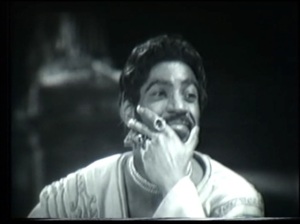 His Othello for Richardson, played with a received pronunciation accent that now sounds old-fashioned and upper-class, is loving, romantic and more than a touch effete. He is stronger in the quieter moments of the drama and, like so many other actors, he fails quite to rise to the moments of rage. In his (uncompleted) autobiography, Heath suggested that he was not overly impressed with his young director:
His Othello for Richardson, played with a received pronunciation accent that now sounds old-fashioned and upper-class, is loving, romantic and more than a touch effete. He is stronger in the quieter moments of the drama and, like so many other actors, he fails quite to rise to the moments of rage. In his (uncompleted) autobiography, Heath suggested that he was not overly impressed with his young director:
My TV Othello was directed by Tony Richardson who said with his slight stutter, just before the first reading with the assembled cast, ‘You must remember that Othello is v-v-very jealous and D-d-Desdemona is entirely innocent.’ (I wrote it down!) We were grateful for this insight. […]
The BBC boasted it was the best Shakespeare to date and sent it to Moscow. I don’t know what they thought of it there. They had a showing for me and my mother in London (1973). I found my performance ‘cabin’d, crib’d and confined’ by the chalk marks on the studio floor. (Deep Are the Roots: Memoirs of a Black Expatriate, University of Massachusetts Press, 1992, p. 144)
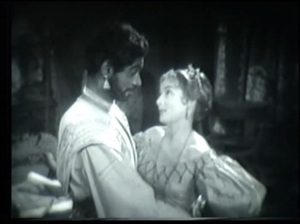 By the moment of Othello’s production, the BBC’s Drama Department was regularly presenting ambitious live plays from Lime Grove. Opened for BBC use in May 1950, the studios at Lime Grove were substantially larger than those at Alexandra Palace, but the plans for Othello still demanded more space for settings than could be comfortably accommodated. A preview article for Radio Times explained that
By the moment of Othello’s production, the BBC’s Drama Department was regularly presenting ambitious live plays from Lime Grove. Opened for BBC use in May 1950, the studios at Lime Grove were substantially larger than those at Alexandra Palace, but the plans for Othello still demanded more space for settings than could be comfortably accommodated. A preview article for Radio Times explained that
The Venice sequences [of Act I] will have been telerecorded some days before simply because the studio is not big enough to house the two sets simultaneously. The ‘live’ performance which follows starts […] with the triumphant arrival in Cyprus. (Elwyn Jones, ‘Bringing Othello to television’, 9 December 1955, p. 5)
Although the difference is not strongly marked, the visuals of Act I (a telerecording of a telerecording) are certainly less distinct than the remainder of the play. The two elements are joined when the picture quickly fades to black and then just as rapidly fades up again. (At present, I know of no other production that utilised this approach.)
Richardson wrote of one of his earlier BBC assignments, The Apollo of Bellac by Giraudoux (broadcast 12 August 1955; a recording apparently exists) that it ‘was thought to be a bit fancy’ (Long Distance Runner, p. 57). And certainly Othello has a number of visual flourishes that could be seen as traces of a young man keen to make his mark. At the end of Act III Scene 3, for example, as Othello says, ‘Now, by yond marble heaven…’ there is an impressive (even if not entirely smooth) ninety-second crane shot that rises up above the Moor and then brings Iago into shot as he makes pledge of his service.
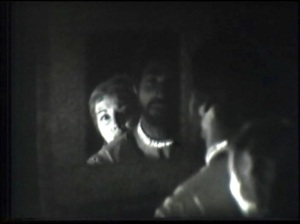 In Act IV Scene I, Othello listens to Iago and Cassio hiding behind a net through which we can see his jealousy, even as he is supposedly masked from the others. And in the following scene there is an impressive mirror shot with Desdemona and Othello seen as themselves and as reflections (the screengrab, left, perhaps gives a sense of this). For the end too, as the text closes with Othello’s ‘To die upon a kiss’ (the subsequent lines are cut) the camera, again mounted on a crane, pulls up and back to show the former lovers sprawled across the bed.
In Act IV Scene I, Othello listens to Iago and Cassio hiding behind a net through which we can see his jealousy, even as he is supposedly masked from the others. And in the following scene there is an impressive mirror shot with Desdemona and Othello seen as themselves and as reflections (the screengrab, left, perhaps gives a sense of this). For the end too, as the text closes with Othello’s ‘To die upon a kiss’ (the subsequent lines are cut) the camera, again mounted on a crane, pulls up and back to show the former lovers sprawled across the bed.
For a version that plays at two hours and five minutes, there have inevitably been cuts, but these have for the most part been made sensitively throughout. In Act III Scene IV the exchange between Desdemona and the clown is cut, but the most significant editing is in Act V, when the first scene is much abbreviated (and the character of Othello makes no appearance), and so is the second, with all the details of Rodrigo’s letter excised.
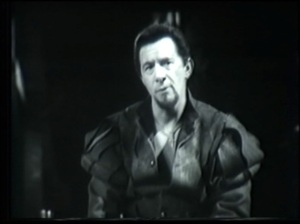 Played once the scene has shifted to Cyprus in one inter-connected set, the production has a confident fluidity suggestive of the complex studio choreography that is more usually associated with ‘golden age’ live drama in the United States. (See Anna Everett, ‘”Golden age” of television drama’, The Museum of Broadcast Communications which also has a strong list of recommendations for further reading.) Of the live productions from British television in the 1950s that I have seen, Richardson’s Othello is certainly among the most visually achieved.
Played once the scene has shifted to Cyprus in one inter-connected set, the production has a confident fluidity suggestive of the complex studio choreography that is more usually associated with ‘golden age’ live drama in the United States. (See Anna Everett, ‘”Golden age” of television drama’, The Museum of Broadcast Communications which also has a strong list of recommendations for further reading.) Of the live productions from British television in the 1950s that I have seen, Richardson’s Othello is certainly among the most visually achieved.
It is not the case, however, that (pace The Times below) the performances appear subordinated to the camerawork. Rosemary Harris is certainly a rather stately Desdemona, possessed of a cut-glass accent, but she conjures up a suggestive poignancy in the final act. Contrasting with Gordon Heath’s plummy Moor, both Paul Rogers as Iago (above, left) and Robert Hardy’s Cassio achieve a credible near-naturalism without at any moment compromising anything of Shakespeare’s language. Both performances remain strikingly fresh, and there is much to enjoy too from Daphne Anderson as Emilia and, making a particularly telling (and sexy) contribution, Billie Whitelaw as Bianca. (The perils of live production are witnessed by a number of missing lines, forgotten by the cast as the drama moves forward; Othello, for example, loses ‘If that the earth could teem a woman’s tears’, making nonsense of his next line, ‘Each drop she falls would prove a crocodile’.)
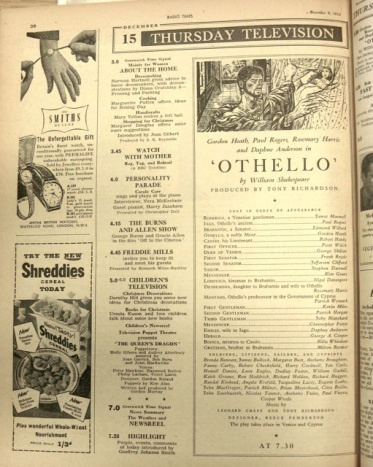
Intriguingly – and this too must have been Richardson’s interpretation – both Iago and Emilia speak their soliloquies directly to camera, establishing a complicity with the viewer in the former’s evil and the latter’s naiveté. Paul Rogers is particularly good in Iago’s soliloquies, which contrast with Othello’s for which Heath does not address the camera.
For all of Richardson’s rather slighting recall, this Othello was clearly a significant event in its day, heralded by a Radio Times cover as well as special billing, and accorded a largely enthusiastic (anonymous) review in The Times:
In the theatre mere physical distance, the space between stage and auditorium, gives a kind of release from Othello, but in one’s own home, where one is imprisoned in a room where the tragedy unfolds as realistically as it did last night upon the television screen, it becomes overpowering. […]
The theatrical producer must surely envy the way the television camera can give a naturally rapid pace to Shakespeare, and also the inventive felicities it makes possible […] But does such [visual] scrutiny sacrifice the poetry to visual realism? The playing last night, skilled as it was, certainly subordinated the words to the visual effects […] (‘Shakespeare on television: Othello’, 16 December 1955, p. 5)
(Many thanks to my Screen Plays colleague Dr. Amanda Wrigley for help with research materials.)
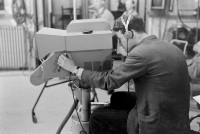
Discussion
Trackbacks/Pingbacks
Pingback: Othello | Adaptations - 3 October 2013